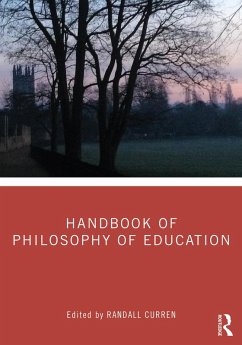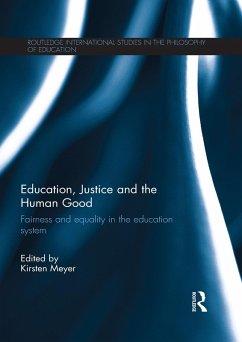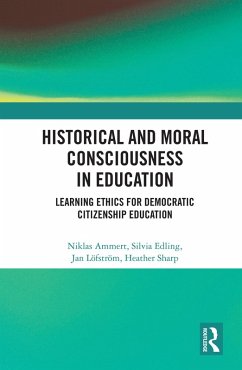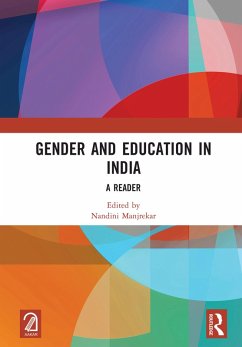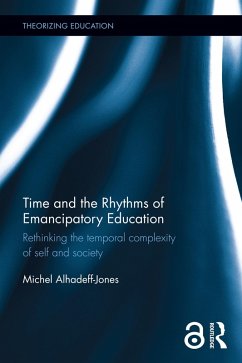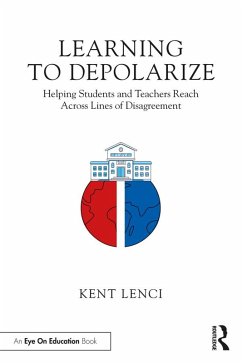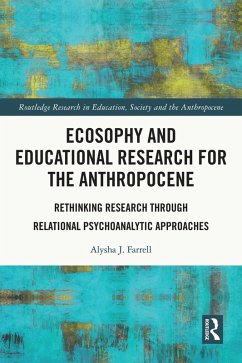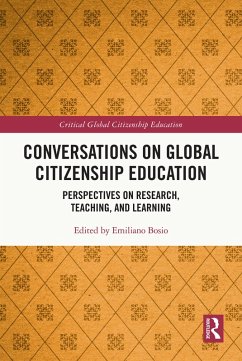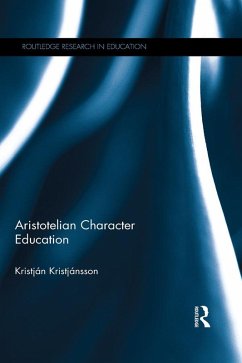
Handbook of Philosophy of Education (eBook, PDF)
Versandkostenfrei!
Sofort per Download lieferbar
103,95 €
inkl. MwSt.
Weitere Ausgaben:

PAYBACK Punkte
52 °P sammeln!
The Handbook of Philosophy of Education is a comprehensive guide to the most important questions about education that are being addressed by philosophers today. Authored by an international team of distinguished philosophers, its thirty-five chapters address fundamental, timely, and controversial questions about educational aims, justice, policy, and practices.Part I (Fundamental Questions) addresses the aims of education, authority to educate, the roles of values and evidence in guiding educational choices, and fundamental questions about human cognition, learning, well-being, and identity. P...
The Handbook of Philosophy of Education is a comprehensive guide to the most important questions about education that are being addressed by philosophers today. Authored by an international team of distinguished philosophers, its thirty-five chapters address fundamental, timely, and controversial questions about educational aims, justice, policy, and practices.
Part I (Fundamental Questions) addresses the aims of education, authority to educate, the roles of values and evidence in guiding educational choices, and fundamental questions about human cognition, learning, well-being, and identity. Part II (Virtues of Mind and Character) is concerned with the educational formation of personal attributes that are often seen as essential to flourishing individuals and societies. This section includes chapters on the cultivation of intellectual and character virtues, the nature and formation of expertise, Stoic virtues, and intellectual vices. Part III (Education and Justice) addresses fundamental and emerging issues of educational justice, from equal educational opportunity, racial domination, and linguistic justice in education, to educational problems of mass migration, global educational justice, the education of working children around the world, and the costs of higher education and upward mobility. Part IV (Educational Practices) addresses controversial aspects of contemporary education - pedagogical, curricular, and managerial practices - that deserve careful examination. These include controversies surrounding free speech and instruction in controversial issues; anti-racist, sustainability, and sex education; and the unfulfilled promises and demoralizing impact of high-stakes accountability schemes.
The format and jargon-free writing in this volume ensure that topics are interesting and accessible, helping facilitate the work of advanced students and professionals in Education.
Part I (Fundamental Questions) addresses the aims of education, authority to educate, the roles of values and evidence in guiding educational choices, and fundamental questions about human cognition, learning, well-being, and identity. Part II (Virtues of Mind and Character) is concerned with the educational formation of personal attributes that are often seen as essential to flourishing individuals and societies. This section includes chapters on the cultivation of intellectual and character virtues, the nature and formation of expertise, Stoic virtues, and intellectual vices. Part III (Education and Justice) addresses fundamental and emerging issues of educational justice, from equal educational opportunity, racial domination, and linguistic justice in education, to educational problems of mass migration, global educational justice, the education of working children around the world, and the costs of higher education and upward mobility. Part IV (Educational Practices) addresses controversial aspects of contemporary education - pedagogical, curricular, and managerial practices - that deserve careful examination. These include controversies surrounding free speech and instruction in controversial issues; anti-racist, sustainability, and sex education; and the unfulfilled promises and demoralizing impact of high-stakes accountability schemes.
The format and jargon-free writing in this volume ensure that topics are interesting and accessible, helping facilitate the work of advanced students and professionals in Education.
Dieser Download kann aus rechtlichen Gründen nur mit Rechnungsadresse in A, B, BG, CY, CZ, D, DK, EW, E, FIN, F, GR, HR, H, IRL, I, LT, L, LR, M, NL, PL, P, R, S, SLO, SK ausgeliefert werden.




